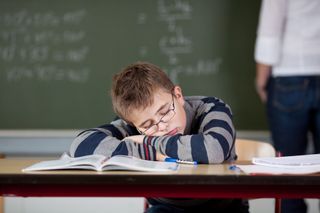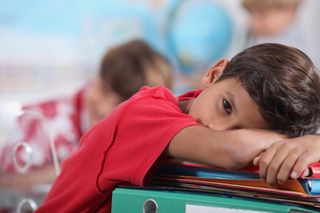How Much Sleep Does Your School-Age Child Need?

The back-to-school time brings many new things: new clothes, new school supplies and new class schedules. And when it comes to getting your kids back on a school sleep schedule, you may also need a new routine. Last year's schedule may not work, because for kids and sleep, age matters.
People's sleep requirements change as they get older, said Dr. Maria Melendres, a pediatric pulmonologist and sleep specialist at Johns Hopkins Children's Center, in Baltimore.
And it's not only the amount of sleep needed that changes with age; it's also the pattern of sleep stages that occur during the night, Melendres told Live Science. [10 Scientific Tips for Raising Happy Kids]
There are two general types of sleep: rapid eye movement, or REM, sleep and non-REM sleep, Melendres said. Depending on a person's age, the amount of time the individual spends in these stages varies, she said. It's believed that the different stages of sleep have different functions, though those exact functions are unknown, she added.
Both types of sleep are necessary for optimal learning, but it's thought that REM sleep is particularly vital for cognitive functions, such as consolidating memories, and for the growth and development of the central nervous system, Melendres said. Non-REM sleep is thought to be more restorative; in other words, it's the type of sleep that helps keep you awake during the day, she said.
Many recommendations about sleep stay the same no matter your age; for example, it's always important to try to go to sleep and wake up at the same time every day. And screen time at night — from using phones, laptops, televisions or tablets — is always a no-no (the light from screens has been shown to suppress levels of the sleep hormone melatonin in the brain).
But other recommendations do change with age. Here are the best sleep tips for your children, from preschool age to high school age.
Sign up for the Live Science daily newsletter now
Get the world’s most fascinating discoveries delivered straight to your inbox.
Preschoolers (3- to 5-year-olds)

Children at this age may actually start going to bed a little earlier than they did as toddlers, because they are no longer napping, Melendres said.Preschoolers need 10 to 13 hours of sleep, according to the National Sleep Foundation.
But that doesn't guarantee that bedtime will be easy. It's also during this age that children may develop what experts call "behavioral insomnia," Melendres said. Parents of small children may be familiar with this phenomenon, which occurs when children start testing the limits of bedtime, she said.
Little kids may refuse to go to bed by coming up with excuses such as "I need another hug" or "I need a glass of water," Melendres said.
But the most important thing that a parent can do in this case is set limits, she said. Behavioral insomnia is perpetuated when parents give in to what the kids want, she said.
School-age children (6- to 13-year-olds)

The National Sleep Foundation recommends that school-age children get from 9 to 11 hours of sleep each night. Most kids this age do get the recommended amount of sleep, Melendres said.
It's during this period that some kids may develop nighttime fears, such as a fear of the dark, Melendres said. Younger school-age children (and older preschoolers, too) have wild imaginations, she said. Other problems, such as nightmares and snoring, may also affect children's sleep at this age, she said. [Top 11 Spooky Sleep Disorders]
Kids in this age group spend a lot of their sleep time in slow-wave sleep, or deep sleep (a type of non-REM sleep), Melendres said. Because this type of sleep is so restorative, school-age children are usually very alert during the day, she said. That means that when you see third- or fourth-graders, for example, who fall asleep in school all the time, it's a big red flag that they may not be getting enough sleep, she added.
Moreover, doctors know that not getting enough sleep can affect every aspect of a child's day, Melendres said. It's not just performance in school, she said. Sleep deprivation affects attention, concentration, decision making and problem solving, Melendres added. It can also make kids moody and even hyperactive, she said.
To ensure that school-age children get enough sleep, it's important that they have a regular sleep schedule on both weekdays and weekends, Melendres said. Bedtimes shouldn't vary between more than 1 or 2 hours from weekday to weekend, she said.
Teenagers (14- to 17-year-olds)

Teenagers often fall short of getting their recommended 8 to 10 hours of sleep a night, Melendres said. Indeed, only about a third of all teenagers get enough sleep, she said.
Kids in this age group have a lot of demands, such as after-school activities and homework, which can keep them up at night, and then they have to wake up very early for school, Melendres said.
But at this age, parents no longer have as much control over bedtime as they once did.
Moreover, teenagers' circadian rhythms may make it difficult for them to fall asleep early enough at night to get enough sleep. Kids' biological clocks naturally shift around the time of puberty, Melendres said. Someone who was able to easily fall asleep at 9 o'clock during his or her school-age years would have a natural tendency to fall asleep later, after reaching adolescence, Melendres said. [10 Facts Every Parent Should Know About Their Teen's Brain]
And because bedtime is delayed, a teen's natural wake-up time is delayed, too. But even if a teen goes to bed at 11 p.m., to get the recommended 8 to 10 hours of sleep, she or he would have to wake up between 7 a.m. and 9 a.m., which usually isn't feasible on a school day.
As a result, teens are usually chronically sleep-deprived during the week, Melendres said.
Teens may try to make up for this on the weekends by sleeping late, Melendres said. If, for example, a teen gets 7 hours of sleep on school nights, instead of closer to 9 hours (which Melendres said she recommends to teens who come to her clinic), that teenager will have accumulated about 10 hours of sleep debt by the weekend. But teenagers can't make up for all that on the weekend, she said.
And because teens are so tired all the time, it's not uncommon for them to take naps after school, if they have the time, Melendres said. But these naps can make it even more difficult to fall asleep at night, and it becomes a vicious cycle, she said.
Of course, you can't talk about teens without talking about screens. A lot of teens sleep with their devices in their rooms, so in the middle of the night when they wake up to use the bathroom, they'll reflexively check their phones, Melendres said. This has even happened while teens were staying over in a sleep lab, she added.
The American Academy of Pediatrics recommends that parents establish that their children's bedrooms are "screen-free zones."
Originally published on Live Science.

Most Popular

